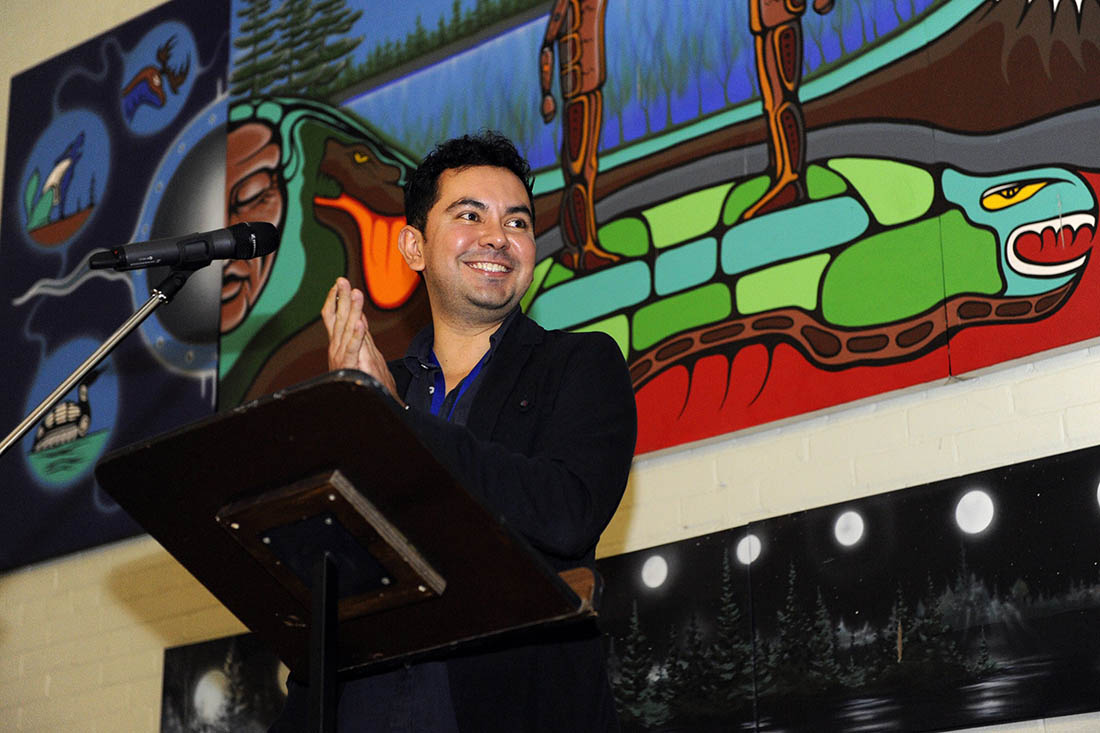The Indigenous Screen Office is an independent entity that advocates for the growth and development of First Nations, Inuit and Métis creators in Canadian film and television. It promotes Indigenous-led and owned productions across films, series, interactive works and podcasts. It also leads capacity building for Indigenous creatives in Canada’s screen sector.
Origins
The creation of the Indigenous Screen Office (ISO) was announced by then-Heritage Minister Mélanie Joly at the Banff World Media Conference on 12 June 2017. The foundation of the ISO followed many years of advocacy by Indigenous filmmakers and industry peers (see also Influential Indigenous Filmmakers in Canada). Its creation drew upon conclusions from the 2015 Truth and Reconciliation Commission and recommendations made by Marcia Nickerson in a 2016 report commissioned by the Canada Media Fund. The 2016 report was itself inspired by a 2004 report by Jeff Bear and years of government inaction that followed. The 2016 report surveyed numerous Indigenous creatives in the screen sector. It concluded that Canada’s history of colonialism caused disproportionate underrepresentation of Indigenous peoples in Canadian stories. It also concluded that Indigenous creatives were severely underpaid when their work was included and that stories about Indigenous cultures were largely made from non-Indigenous points of view. The creation of the independent, Indigenous-led ISO saw financial backing from the Aboriginal Peoples Television Network (APTN), the Canadian Broadcasting Corporation (CBC), the Canada Media Fund, Telefilm Canada, the Canadian Media Producers Association and the National Film Board of Canada.
First Years
In 2018, former film critic and programmer Jesse Wente was appointed the inaugural executive director of the ISO. Wente’s mandate that first year included laying the foundation for the office as a one-person operation. The ISO built its industry presence as an advocacy group and lobbied for narrative sovereignty. Narrative sovereignty means that Indigenous stories must be centered on and told through Indigenous perspectives. It drew inspiration from Screen Australia’s Indigenous Department as a model for representation, production and capacity building. Wente undertook community consultations in the first two-year funding term while establishing the office.
Jesse Wente
Jesse Wente served as the first executive director of the Indigenous Screen Office (ISO). When the ISO was first established in 2018, it was planned as a one-person operation. By the end of 2022, it had expanded to include 10 full-time staff.
(Robert Orkine/Getty Images)
In 2021, the ISO received a commitment of $40.1 million over three years in the federal budget. However, that amount was less than half the budget request submitted by the ISO. The Canadian government pledged support to “ensure Indigenous peoples can tell their own stories and see themselves reflected on-screen." The ISO allocated this funding toward two streams, the Story Fund and Sectoral Development. The Story Fund supports the creation and production of Indigenous-based storytelling. Sectorial Development aims to grow, strengthen and sustain the field for Indigenous creatives. The streams work together as the ISO aims to grow Indigenous filmmaking beyond the micro-budget level at which it was traditionally funded.
Early Years
By the end of 2021 and 2022, the ISO grew the presence of Indigenous filmmaking in Canada. Those two years saw the ISO disburse $24.6 million in funding. By the end of 2022, the ISO had grown to include 10 full-time employees across Canada.
In September 2022, the ISO announced that founding director Jesse Wente would be stepping down from the executive director role. Co-executive director Kerry Swanson was announced as his successor. Wente continued to act in an advisory role during the transition. He stated that he had “achieved the goals [he] set out to accomplish when [he] joined the organization."
Kerry Swanson
Kerry Swanson was named Jesse Wente’s successor in the executive director role of the Indigenous Screen Office (ISO) in 2022. During her time as leader of the organization, the ISO has formed partnerships with major companies in the film industry to
support Indigenous creatives.
(Shawn Goldberg/Getty Images)
Notable early films made with the support of the ISO expanded the potential for Indigenous cinema, including 2021’s Night Raiders and Wildhood. A dystopian film directed by Danis Goulet, Night Raiders, reimagined the history of residential schools as a sci-fi allegory. Wildhood is a Two-Spirit love story directed by Bretten Hannam. That same year, the Canadian film festival circuit saw an “explosion” of Indigenous cinema thanks to the work of the ISO. Three productions led by Indigenous creatives were among the high-profile Canadian films at the 2022 Toronto International Film Festival. All three films were made with the support of the ISO: These productions included Bones of Crows, directed by Marie Clements; Stellar, directed by Darlene Naponse; and Rosie, directed by Gail Maurice. In 2025, the ISO-supported comedy series North of North, created by Stacey Aglok MacDonald and Alethea Arnaquq-Baril, proved a major hit. It premiered in January 2025 on CBC and APTN and streamed on Netflix in April. It quickly became the most popular new series on CBC Gem (the CBC’s streaming service) since the platform’s launch in 2018. The critically acclaimed series was renewed for a second season two weeks after its Netflix premiere.
Funding Controversy
While the ISO was quickly considered a success, Kerry Swanson sounded the alarm in 2023 when the organization was omitted from the federal budget. The ISO’s three-year commitment from the federal government was set to end with the fiscal year in March 2024. This left the organization in a place of uncertainty. In the 2024 federal budget, the Canadian government committed to permanently supporting the ISO with a $65 million commitment over five years.
Policies
The ISO implements practices recommended by On-Screen Protocols and Pathways: A Media Production Guide to Working with First Nations, Inuit and Metis Culture, Concepts and Communities. This document was published by the imagineNATIVE Film + Media Arts Festival in 2019 and is a guide to Indigenous production. The guide emphasizes authentic storytelling, active collaboration and narrative sovereignty. The guide was meant to serve as a living document. As such, the ISO has revised it in consultation with community peers over the years. Additionally, ISO has served as a resource regarding the implementation of its protocols.
In 2021, the ISO launched an Indigenous identity consultation process. The consultations stemmed from controversies that erupted from a December 2020 CBC report that claimed director Michelle Latimer was not Indigenous. Latimer was known for her documentary Inconvenient Indian and series Trickster, both of which drew considerable acclaim as Indigenous productions in the fall of 2020. (These productions predated the ISO’s funding activities.) The controversy inspired more rigorous vetting of Indigenous identities of funding applicants.
Capacity Building
In addition to funding production for screen storytelling, the ISO has helped to develop production hubs and opportunities for Indigenous creatives. This includes a $1 million commitment to an 11,600-square-foot production studio in Iqaluit, Nunavut. It has also expanded its funding to include podcasts and supported the 2021 launch of Uvagut TV, Canada’s first Inuit-language TV channel (see also Inuktitut). The ISO also provides support funding for Indigenous film festivals. It has served in an advisory capacity for the inclusion of Indigenous voices at festivals and industry summits. The ISO has also developed partnerships with companies including Netflix, Amazon Studios, Google and Paramount+ to mentor and support Indigenous creatives. In 2021, it launched the Solidarity Fund to support BIPOC creatives across the country. The success of the ISO helped inspire the creation of the Black Screen Office in 2020.

 Share on Facebook
Share on Facebook Share on X
Share on X Share by Email
Share by Email Share on Google Classroom
Share on Google Classroom






